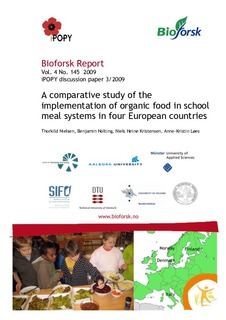A comparative study of the implementation of organic food in school meal systems in four European countries
Research report
Permanent lenke
http://hdl.handle.net/11250/2506211Utgivelsesdato
2009-11-10Metadata
Vis full innførselSamlinger
Sammendrag
Based on national reports from Denmark, Finland, Italy and Norway, describing the school meal systems and to which extent organic food is integrated there, this report identifies differences between the four countries and experiences made with organic food procurement and the dissemination of organic ingredients in school meals. Such knowledge will help to understand the possibilities and restrictions for increasing organic food in school meal systems, and to reveal the room of manoeuvre for public organic food procurement for youth in each country. In the report, similarities and differences of the national school meal systems in general are first discussed, because this context determines the scope of organic food procurement. The history and current situation of the school meal systems, framework conditions of public food procurement in schools (laws, guidelines, control, financing), the structure of the school meal provision and public discourses about school meals are described. Next, focus is set on the use and development of organic food in school meal systems. Some school meal system cases are presented by the amount of organic food used, the arguments for organic school food and challenges and barriers for the dissemination of organic food. Finally, school meal system actors in general as well as “organic” actors such as promoters, decision makers, companies and organisations are compared across the four countries. Summarizing chapters are found at the end of each section of the report. In short, warm meals are served for free to all pupils daily in Finland, and subsidized according to family income to all pupils at least twice a week in Italy. Norway and Denmark stick to a packed lunch brought from home, with additional milk and fruit subscription schemes and a developing additional or complementary meal service especially in Denmark with subsidized prices. Organic food is much emphasised in Italy and Denmark; significantly less in Finland and Norway.
